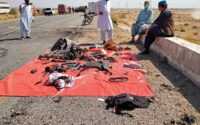Three brothers recall harrowing escape from Budapest on Holocaust Remembrance Day
Three brothers who escaped Budapest as German SS forces were rounding up Hungary’s Jews in 1944 have decided to share their story of improbable survival on Holocaust Remembrance Day.
The three Lindenblatt brothers – Jehuda, George and Robert – were sent into hiding during the Nazi invasion as more than 400,000 were deported from Hungary – mainly to Auschwitz, where most were gassed on arrival.
The brothers, the oldest of whom was 7 when they fled, moved between safe houses and secret locations for survival until liberation.
The family eventually moved to New York some 15 years after the war.
Their incredible story of survival is part of the Claims Conference‘s new digital campaign, “Our Holocaust Story: A Pledge to Remember.”
The campaign includes 100 survivors from around the US and the world, sharing their personal testimony of persecution surrounded by second and third generations of family, and stresses the urgency to keep their stories alive in order for future generations to learn from past atrocities.
“This is really the last opportunity to hear direct, firsthand witness testimony, as so many Holocaust survivors are passing away. This is the time for the next generations to pledge to carry on the legacy and the story,” Claims Conference executive vice president, Greg Schneider, told The Post.
“The lessons are just so important, especially given the huge rise of antisemitism now in the US and elsewhere.”

The Lindenblatt brothers recall how they would watch the German invasion through their first-floor apartment window, innocently mirroring their salutes before their mother, Piroska, admonished the boys.
“We saluted them like they did, and my mother said, ‘Get away from the window,’” recalled Robert, 83, of Forest Hills.
The Lindenblatts’ father, Jeno, owned a dairy business and was desperate to save his family.
Jeno pleaded with [officials] “not to take my family away,” according to Robert.
“He gave him money. And he said, ‘I don’t need no Jewish money,’” recalled Robert, adding that the official threw their father’s money into a fire and burned it.

Their mother defiantly ignored the decree for all Jewish women 16 and up to report to the train station.
Her 86-year-old son Jehuda recalled how she vowed, “I’m not going. I’m staying with my children. Whatever happens, we stay together.”
“And that saved our lives,” he added triumphantly, “Because she didn’t leave, we are here – 79 years later.”
But Jeno, who escaped a forced labor camp to return to his family, frantically worked to save his sons – arranging for their stay at a sprawling factory complex called the Glass House, a key refuge site run by Swiss ambassador Carl Lutz that ultimately saved 40,000 Hungarian Jews from deportation.
Mindful to hide any outward signs of Jewish expression, the boys stashed away any telltale garb while being transported by a dolly and hidden under piles of clothing.

“My star of David was in my pocket,” said brother George, 84, remembering vividly laying still on a bed of fiberglass. “I was only 6 ½ years old, but I remember it was very painful.”
The three enjoyed refuge – if only for a week – when all the children were kicked out, and then secreted by the underground to an orphanage – a glorified bakery that doubled as a Red Cross shelter for women and children and was under Swiss protection.
The shelter would serve as a refuge for the Lindenblatt boys for the next month – until the money ran out and they were in search of shelter yet again after yet another banishment.
“Every minute we were in danger,” said Robert, who recounted his nanny risking her life searching for food, using the young blond-haired boy who served as the perfect foil.
“[With] a blond boy, they will not stop her,” he said. “We climbed through dead bodies,” he said of their forage for beans after breaking into an abandoned building.
The bean supply, which was served twice a day, lasted a week.
“I was so hungry,” said Jehuda, a longtime volunteer EMT with Hatzolah. “If you never experienced hunger, you can’t explain to anybody what this is.”
When the boy spied a piece of his cousin’s soap, he pleaded to eat it. After it was denied to him, he dreamt that night of blowing bubbles.
Still, he’s “one of the lucky” ones to survive the Holocaust, said Jehuda, whose mother’s wedding ring was eventually traded for a piece of ham to help feed other starving children.
Their grandfather, an Orthodox rabbi, tried to mask his overt Jewishness – shaving his beard and donning a traditional green Hungarian hat while brandishing forged papers to help save fellow Jews facing deportation to Auschwitz.

On the street, he was suddenly ordered to drop his pants in order to determine if he was circumcised, which in Hungary were only Jews.
The pious man was then taken to the Danube river and shot dead.
He was one of nearly 80,000 Jews who were killed in Budapest itself, shot on the banks of the Danube and discarded into the freezing river.
The boys sought refuge in the legendary Swedish diplomat Raoul Wallenberg’s “protective buildings” until liberation.
Their story of survival – of all three boys – is nothing short of a miracle, they said, when 1.5 million Jewish children and one-third of world Jewry were murdered in the Holocaust.
“Today, in 2023, the three of us are here,” Jehuda said with pride. “The three of us telling our stories.”
The brothers, now grandfathers, are flanked by family members in the video, including George’s teenage grandson, Ben Gilad, who said, “It’s important to remember because we can’t forget our Jewish history and our family’s history.”


